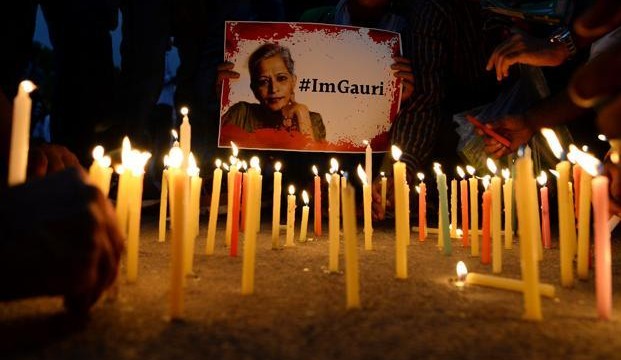Lankesh And Free Speech: Gagged, Tortured And Shot
The Asian News International (ANI) tweeted on September 5th, 2017, “There has been a shootout at Gauri Lankesh’s house this evening; she is no more. Body found in the veranda.” Another tweet swiftly followed, “This is a cowardly act, she is just a writer & journalist, not a terrorist or a Naxalite.” Gauri Lankesh, a senior journalist from Karnataka, had been shown and portrayed as a critic of Hindu-right wing extremism by journalists and news outlets around the country after she was shot dead in Karnataka, India. A total of seven bullets were fired, four missing the target and three hitting Lankesh. The Chief Minister of Karnataka termed the murder as brutal and further stated that this was an “assassination on democracy”.
Freedom of press and protection of free speech has long been debated in the halls of Parliament and the corridors of the judiciary in India. Be it the First Amendment in the United States, Article 19(1) of the Constitution of India or the international covenants, there has always been an issue with respect to the limitations on free speech and expression. The horrendous and brutal attack on Gauri Lankesh reminded the country of the horrors of emergency, where the press was stifled and gagged until it choked. What is termed as the fourth pillar of democracy, now again looks subservient to the other three pillars. Two weeks ago, Madhya Pradesh police arrested nineteen-year old Abhishek Mishra for attacking the Chief Minister of Madhya Pradesh on social media regarding the recent failure of demonetization carried out by the Narendra Modi government. Further down the timeline, two months ago there was a gratuitous misuse of legislative privilege in Karnataka, where two journalists were sentenced to jail terms by the Karnataka Assembly for publishing defamatory materials.
Justice Brandeis in the case of Whitney v. California rightly stated that those who won our independence believed that the final end of the state was to make people free to develop their faculties and make deliberate choices to prevail over arbitrary forces. They valued liberty both as an end and as a means. They believed liberty to be the secret of happiness and courage to be the secret of liberty. They believed that the freedom to think as you will and to speak as you think was indispensable to the discovery and spread of political truth. The current predicament amongst the public is to be silent until something untoward happens. A few months ago, the Supreme Court of India in the Subramanian Swamy case, held that Section 499 of the Indian Penal Code – which deals with criminal punishment for defamation – is not disproportionate and not ultra vires the provisions of the Constitution. This may have proceeded against the international trend of decriminalizing defamation albeit the court proceeded on the basis of reasonableness. On the other hand, in Shreya Singhal case, the apex court proceeded to strike down Section 66A of the Information Technology Act 2000 as being violative of Article 19(1) of the Constitution. Article 19(1) enshrines the fundamental right of free speech and expression. In the past, the Supreme Court of India, as a watchdog, has taken cognizance of such cases suo motu where the press was gagged and whistles were blown; the sceptre must be taken again. The Supreme Court must realize that free speech is the base of human rights, the root of human nature and the mother of truth. Protection of free speech cannot be done by imparting judgments, but by imparting justice to those who stood to protect it.
On a sympathetic note, the death of Gauri Lankesh has received considerable anger from the public with candlelight marches and condolence meetings throughout the country. On the other hand, there are also those who have taken to social media to post pictures of Gauri Lankesh with students of Jawaharlal Nehru University, especially the ones alleged to have committed sedition, with the tagline, ‘what goes around comes around.’ A few others have tried to connect the dots with Gauri Lankesh’s defamation case and Amit Malviya’s tweet on November 29th, 2016 which reads as follows, “Prahlad Joshi, BJP MP from Dharwad, gets Gouri Lankesh convicted in a defamation case… Hope other journos take note.” Blaming any right-wing Hindu group for the murder of Lankesh would be an unsubstantiated allegation. Unfortunately, the way circumstances are panning out, these unsubstantiated allegations may be the reason for any journalist’s conviction. Men feared witches and burnt women, politicians fear free speech and shoot writers. Unfortunately, Michelle Obama’s words ring bells of fear and woes,
“I have seen how leaders rule by intimidation. Leaders who demonize and dehumanize entire groups of people often do so because they have nothing else to offer and I have seen how places that stifle the voice and dismiss the potential of their citizens are diminished: how they are less vital, less hopeful, less free.”
The views expressed in this article are those of the author and do not necessarily represent the views of CourtingTheLaw.com or any other organization with which he might be associated.


